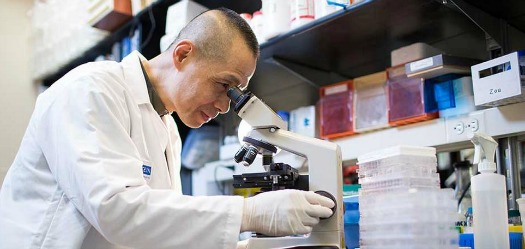
For Einstein scientist Yiyu Zou, Ph.D., the struggle against lung cancer and the crusade to find better treatments are deeply personal.
In a recent Einstein magazine article, Dr. Zou explained what it was like in China watching his father, a heavy smoker, lose 80 percent of his lung capacity. He eventually died from lymphoma.
“I also saw that a lot of people in China were developing lung cancer, and I thought, ‘I have to gain the knowledge to fight this disease.’”
According to the American Lung Association, lung cancer is the most common cancer in the world, killing 1.37 million people each year. In the U.S., it is the second most deadly form of cancer for both men and women. In 2014, an estimated 160,000 will die from the disease. Lung cancer can exact a painful toll on patients and their families. And the financial burden is huge. By 2020, the NIH projects that the cost of patient care for and economic damage done by lung cancer could exceed $158 billion.
In his research, Dr. Zou is studying the use of the inhaled drug azacytidine to prevent lung cancer. He explains, “One of my projects looks at how environmental carcinogens cause lung cancer. I developed a mouse model in which we mimic human lung cancer by continually injecting tobacco carcinogens into the mouse lung for more than a year. We saw the classic precancerous stages and, after nine months, tiny cancer nodules. When we administered aerosolized azacytidine along with the carcinogens, only half the mice developed tumors. We are submitting an Investigational New Drug application to the Food and Drug Administration for testing this therapy on people.”
You can learn more about Dr. Zou and his research at https://magazine.einstein.yu.edu/winterspring-2014/lab-chat-2/.


Comments on this entry are closed.
I hope that this study will take us to another significant step forward in the development of lung cancer treatment. As stigma associated with lung cancer translates into a massive inequality in research funding. This disease is now one of the deadliest form of cancer because it is difficult to predict and diagnose. It’s still the leading cancer killer in both men and women. Majority of lung cancer diagnoses are made too late since there is no surefire way to determine if someone should be screened and at what age those screenings should start.